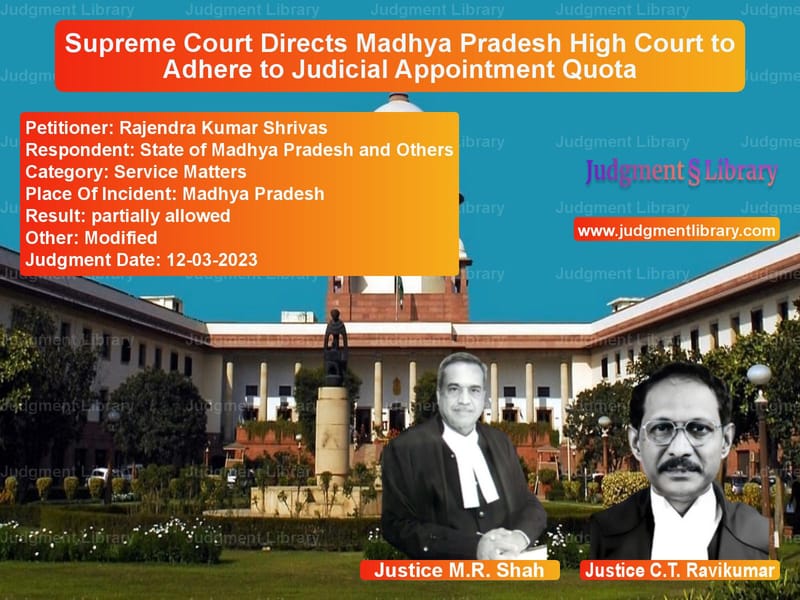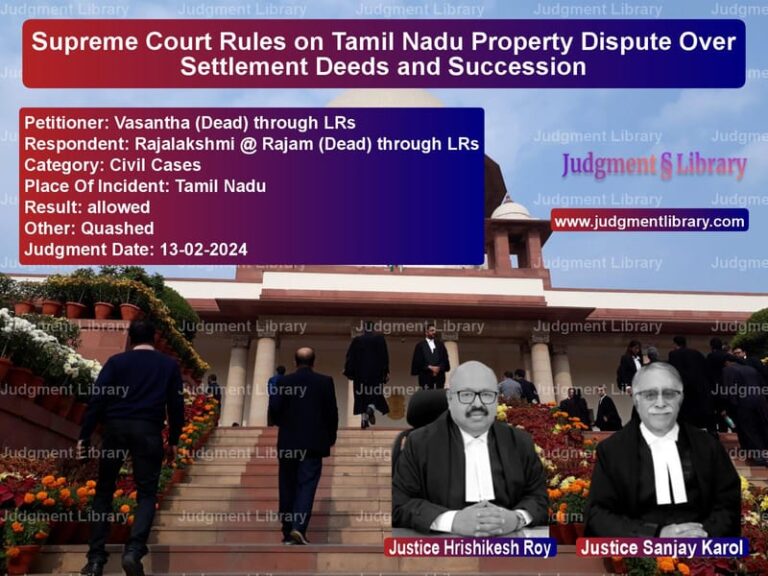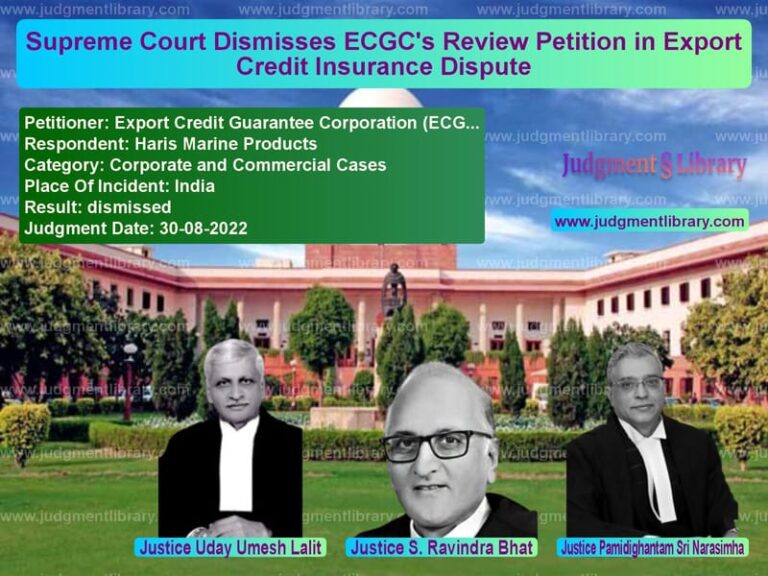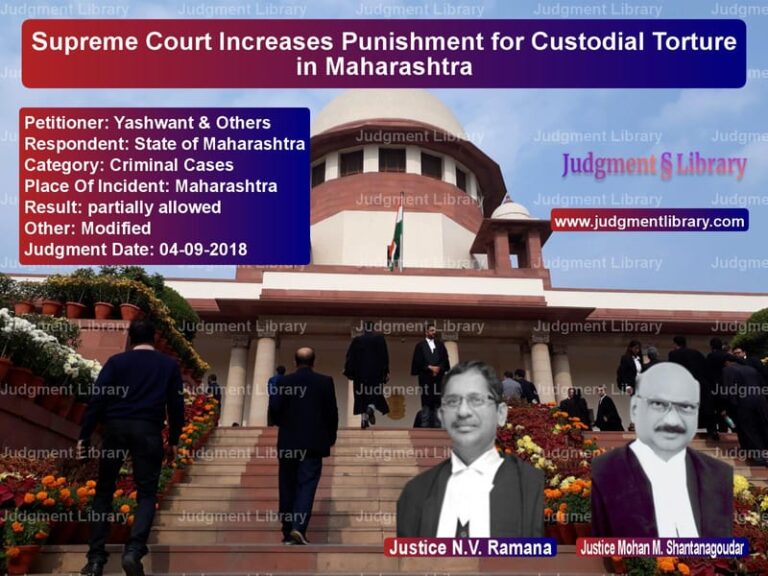Supreme Court Directs Madhya Pradesh High Court to Adhere to Judicial Appointment Quota
The Supreme Court of India has ruled in Rajendra Kumar Shrivas v. State of Madhya Pradesh & Others that the Madhya Pradesh High Court must adhere to the 10% quota for judicial appointments through the limited departmental competitive examination (LDCE). The judgment reinforces the importance of maintaining judicial service quotas as per the directives in the All India Judges’ Association case.
Background of the Case
The case arose from allegations that the Madhya Pradesh High Court had exceeded the 10% quota prescribed for judicial appointments through the LDCE, violating the Supreme Court’s directive in All India Judges’ Association v. Union of India (2010). The petitioners contended that despite clear orders from the Supreme Court to cap the LDCE quota at 10%, the High Court continued to exceed this limit.
The appellant, Rajendra Kumar Shrivas, challenged the High Court’s actions through a writ petition in the Madhya Pradesh High Court, which was dismissed. He then approached the Supreme Court, seeking enforcement of the Supreme Court’s 2010 ruling.
Legal Issues Considered
- Whether the Madhya Pradesh High Court violated the Supreme Court’s order by exceeding the 10% quota for LDCE appointments.
- Whether judicial appointments made in excess of the quota should be canceled.
- The extent to which High Courts must adhere to Supreme Court directives in matters of judicial recruitment.
Arguments of the Parties
Petitioner’s Arguments (Rajendra Kumar Shrivas)
- The Madhya Pradesh High Court continued to make LDCE appointments exceeding 10%, disregarding the Supreme Court’s ruling.
- The Supreme Court’s judgment in All India Judges’ Association was binding and required compliance from all High Courts.
- The quota breach deprived eligible candidates of regular promotions, affecting their career progression.
- Appointments beyond the prescribed 10% quota were illegal and should be annulled.
Respondent’s Arguments (State of Madhya Pradesh & Others)
- The excess appointments were necessary due to administrative reasons and judicial workload.
- The rules were amended in 2018 to align with the Supreme Court’s directive, and future recruitments would comply with the quota.
- Canceling existing appointments would create a judicial crisis and disrupt the functioning of the courts.
Key Observations of the Supreme Court
The Supreme Court made several important observations in its ruling:
- Strict Compliance with Quota: The Court reiterated that High Courts must follow the 10% quota strictly and cannot exceed it under any circumstances.
- Adjustment of Excess Appointments: The Court directed that any appointments made in excess of the quota since 2011 must be adjusted in future recruitments.
- Rule Amendment Not an Excuse: The Court held that the delayed amendment of service rules did not justify quota breaches.
- Appointments Beyond Quota Not Canceled: While acknowledging the breach, the Court did not cancel past appointments but directed corrective measures for future recruitments.
Final Ruling
The Supreme Court issued the following directives:
- The Madhya Pradesh High Court must comply with the 10% LDCE quota from January 1, 2011, onwards.
- If excess appointments have been made since 2011, they must be adjusted in future recruitments.
- The High Court must ensure that judicial service rules are in full compliance with the Supreme Court’s ruling in All India Judges’ Association.
- Past appointments exceeding the quota will not be disturbed, but future violations will not be tolerated.
Accordingly, the Supreme Court disposed of the appeal while directing the High Court to implement corrective measures.
Implications of the Judgment
This ruling has significant implications for judicial appointments across India:
- Ensures Compliance with Supreme Court Directives: High Courts cannot deviate from Supreme Court orders in judicial service matters.
- Protects Career Progression: Ensuring that quota limits are respected prevents unfair treatment of eligible candidates for regular promotions.
- Mandates Accountability: The ruling holds High Courts accountable for non-compliance with binding judicial orders.
- Prevents Future Quota Violations: By requiring adjustments in future recruitments, the decision ensures that past mistakes are rectified.
Conclusion
The Supreme Court’s ruling in Rajendra Kumar Shrivas v. State of Madhya Pradesh reinforces the need for High Courts to adhere to judicial appointment quotas as prescribed in the All India Judges’ Association case. By directing corrective measures without canceling past appointments, the judgment strikes a balance between enforcing compliance and preventing disruption in judicial services. This decision serves as a crucial precedent in ensuring transparency and fairness in judicial recruitment processes across India.
Read also: https://judgmentlibrary.com/supreme-court-upholds-police-authoritys-discretion-in-recruitment-case/
Petitioner Name: Rajendra Kumar Shrivas.Respondent Name: State of Madhya Pradesh and Others.Judgment By: Justice M.R. Shah, Justice C.T. Ravikumar.Place Of Incident: Madhya Pradesh.Judgment Date: 12-03-2023.
Don’t miss out on the full details! Download the complete judgment in PDF format below and gain valuable insights instantly!
Download Judgment: rajendra-kumar-shriv-vs-state-of-madhya-prad-supreme-court-of-india-judgment-dated-12-03-2023.pdf
Directly Download Judgment: Directly download this Judgment
See all petitions in Recruitment Policies
See all petitions in Public Sector Employees
See all petitions in Promotion Cases
See all petitions in Judgment by Mukeshkumar Rasikbhai Shah
See all petitions in Judgment by C.T. Ravikumar
See all petitions in partially allowed
See all petitions in Modified
See all petitions in supreme court of India judgments March 2023
See all petitions in 2023 judgments
See all posts in Service Matters Category
See all allowed petitions in Service Matters Category
See all Dismissed petitions in Service Matters Category
See all partially allowed petitions in Service Matters Category







